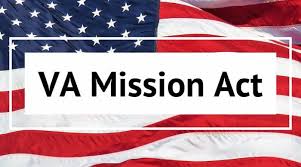-
Drop us an email: info@tommysteam.com
-
Call us: 1-800-895-6898
- Login
Author : Gerard Tirico | Jul 6, 2019
Veterans Mission ACT of 2019
This new law which went into effect in June 2019 by the Department of Veterans Affairs (VA) will allow the ability to provide veterans with the best health care possible, whether at VA health care facilities or with community providers.
The legislation sailed through Congress with overwhelming bipartisan support and the strong backing of veterans service organizations across the country.
President Donald J. Trump’s signature put us on a path to implementing these reforms. On June 6, the MISSION Act will enable VA to consolidate the department’s community care efforts into a single, simple-to-use program that will empower veterans with the ability to choose the health care providers they trust.
There will be less red tape, more satisfaction and predictability for patients, more efficiency for our clinicians, and better value for taxpayers.
Veterans will be eligible to get community care for a variety of reasons, including when VA can’t provide the treatment they need or when care outside our system is in the best medical interest of the patient.
The Department of the VA listened and heard from veterans that they preferred standards based on drive times rather than driving mileage because those standards better reflect veteran experiences, especially in large urban areas with lots of traffic.
To ensure our veterans are spending their time getting care instead of driving to it, patients facing an average drive time of 30-minutes or more for VA primary or mental health care or non-institutional extended care services, will have the option of choosing a community provider closer to home. For specialty care, the drive-time standard will be an average of 60 minutes.
And to get veterans the care they need when they need it, VA patients facing a 20-day or more wait time for primary or mental health care, or non-institutional extended care services, will have the option of choosing a community provider who can deliver that care faster. For specialty care, the wait-time standard will be 28 days.
For additional convenience and timely treatment, eligible veterans will also have access to urgent, walk-in care that gives them the choice to receive certain services at participating community clinics in their communities. (To access this new benefit, veterans will select a provider in VA’s community care network and may be charged a copayment.)
Veterans will be encouraged to ask VA about these new options, and well-trained staff will be available to help them quickly understand their choices.
We are seeing more patients than ever before, more quickly than ever before and studies show VA now compares favorably to the private sector for access and quality of care – and in many cases exceeds it.
Patients’ trust in VA care has skyrocketed to 87.7 percent, and in the last fiscal year, VA completed more than 58 million internal appointments – a record high and 623,000 more than the year before.
VA employees are noticing improvements as well. VA ranked sixth out of 17 Federal Government agencies in the Partnership for Public Service’s most recent “Best Places to Work” survey, up from 17th the year prior.
To maintain the trust of our veterans, we must continue to deliver. And we will constantly innovate, upgrade, and pursue ways to better serve our Nation’s heroes.
The MISSION Act is a vital part of this effort, giving VA the ability to implement the best practices we’ve learned in our nearly 75 years of experience offering community care.
The core of the doctor-patient relationship is trust. President Trump promised veterans that this core value would shape the VA.
Key aspects of community care eligibility:
1/ Veterans must receive approval from VA prior to obtaining care from a community provider in most circumstances.
2/ Veterans must either be enrolled in VA health care or be eligible for VA care without needing to enroll to be eligible for community care.
3/ Eligibility will continue to be dependent upon a Veterans’s individual health care needs or circumstances.
4/ VA staff members generally make all eligibility determinations.
5/ Veterans will usually have the option to receive care at a VA medical facility regardless of their eligibility for community care.
6/ Meeting any one of six eligibility criteria listed below is sufficient to be referred to a community provider-a Veterans does not have to meet all of them to be eligible.
Eligibility Criteria
1/ Veteran needs a service not available at a VA medical facility.
2/ Veteran lives in a US state or territory without a full-service VA medical facility.
3/ Veteran qualifies under the “Grandfather” provision related to distance eligibility for the Veterans Choice Program.
4/ VA cannot furnish care within certain designated access standards.
5/ It is in the veterans best medical intere
6/ A VA service line does not meet quality standards.
You can review the VA website which will provide all the details related to the new Mission Act of 2019. It is recommended that if you are a veteran then you should discuss all the options with your local VA medical facility and they will help you make the best decision related to your situation.